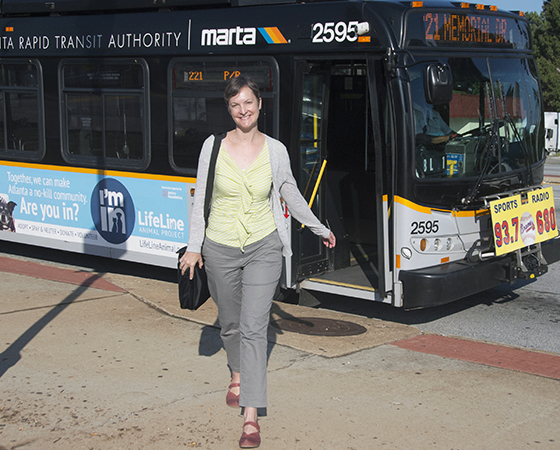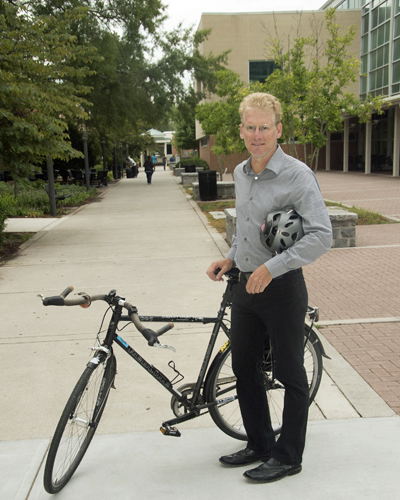
Dr. Lauren Curtright, who commutes to GPC's Clarkston Campus by bus, has kept 25,000 pounds of pollution out of the air since 2011. (photo by Bill Roa)

Barry Hall opts to commute to Georgia Perimeter College's Clarkston Campus via bicycle. (photo by Bill Roa)
Faculty members find alternative commuting is rewarding
“It’s Friday: time to log your commutes,” tweets a reminder from Georgia Commute Options as Georgia Perimeter College faculty members Dr. Lauren Curtright and Barry Hall take note. Both have have made the choice to reduce traffic congestion and pollution by not driving to campus. Curtright buses; Hall bikes.
Hall, a passionate cyclist who recently returned from an Oregon bike tour, logs a 12-mile round trip to and from GPC’s Clarkston Campus every day. And he does so in every kind of weather, “although I once had to hopscotch via MARTA due to a torrential rain,” he admits.
Since 2011, Curtright has been logging her alternative commuter miles at Georgia Commute Options, a program of the Georgia Department of Transportation that helps commuters, employers and property managers take advantage of commute alternatives. GCO’s theme, “get more by driving less,” has paid off literally for Curtright who has “won a few $20 drawings over the years.”
Yet she never realized GCO had an award to honor alternative commuters until she was notified recently that she had won the Commuter Champion achievement certificate. The award honors those who have reached milestones of 25,000 or 50,000 pounds of pollution reduced by choosing a “clean commuting” option such carpooling, vanpooling, riding transit, teleworking, working a compressed work week, walking or biking to work.
“It turns out my Commuter Champion award is for keeping 25,000 pounds of pollution out of the air,” Curtright explains.
Georgia Commute Options also offers several monetary incentives plus counseling, webinars, ride-matching services and information about tax breaks for commuters.
Curtright first became a transit commuter while a student at the University of Minnesota in Minneapolis, where it became “a habit for me to take the bus to classes.”
Then, after moving to Atlanta, she didn’t have a car for the first six months. “So I took MARTA to my teaching job at Georgia Tech. Now I live right on the bus line, about a mile’s walk from a train station, so it’s convenient for me to take transit to GPC,” she says.
“I notice more GPC students than faculty or staff on MARTA to and from Clarkston Campus,” she adds. “I'd like to encourage administrators and faculty at Georgia Perimeter to commute by MARTA and push for improving our campuses’ accessibility to transit.”
Curtright and other GPC bus and train riders can take advantage of MARTA’s University Pass Program, which offers discounts to students, staff and faculty. To purchase a pass, visit your campus Student Accounts office. Or get a taste of the MARTA experience by riding free on Labor Day, Sept. 7.
How do you get to campus? Share your alternative forms of transporation by commenting on this story.

What others are saying
Commuting to campus without contributing air pollution
Choosing to use a muscle powered transportation machine to arrive on campus has several sensible benefits. It burns calories and no gasoline. It takes up less space when parked. We can go from door to door. Soft pedal on the shortest route to work and then choose a longer route and pedal harder to get home with the fitness workout done for free.